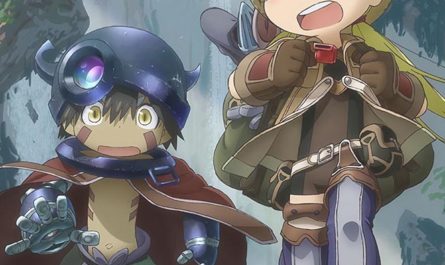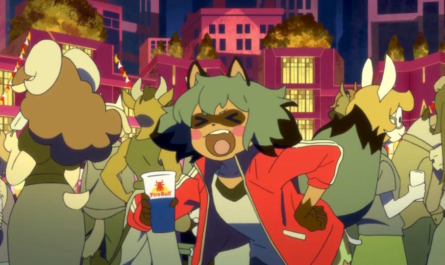Sweetness and Lightning
By 1000Throws

Recently widowed teacher Kohei Inuzuka desperately wants to learn to cook tasty food for his young daughter Tsumugi. In the absence of his wife, Kohei has resorted one too many times to making microwaveable meals for dinner, and his daughter has begun to grow tired of them. One day, he meets a student named Kotori Iida, whose family just so happens to own a restaurant perfect for cooking practice. Seizing on the opportunity, Kohei – with a curious Tsumugi in tow – decides to meet with Kotori for near-nightly cooking sessions, with an eye to becoming an expert at making delicious family meals.

This is the simple story driving sweetness and lightning (yes, the title is all lowercase), a TMS Entertainment series that just wrapped up this summer. It fits comfortably into the “slice of life” niche, a descriptor used to denote anime with calm, soothing atmospheres and low-stakes narratives. I don’t have anything against these types of shows per se, but I usually stay away from them since they tend to veer too far into flat-out-dull territory. The premise of sweetness and lightning caught my attention, though, and as I’m also a fan of family-centric slice-of-lifes like Yotsuba&!, I decided to check it out. And luckily, there is quite a bit going in its favor.

First, though, to tackle the elephant in the room – the relationship between thirty-something Kohei and high school-age Kotori. On the one hand, the show does address the potential awkwardness of a teacher meeting with his young student for frequent cooking sessions; on the other hand, the original manga is still ongoing, so it’s possible that things escalate between them in the future. Now, that said, it’s important to note that the show itself never implies more than an unrequited crush on Kotori’s part, and the overall tone of sweetness and lightning does not suggest it going any further than that. It’s entirely possible that I’m making too much of their relationship, but that’s mostly because anime’s track record with these scenarios has made me skittish. Make no mistake, though; the emotional core of the show is the relationship between father and daughter, and in that arena, it delivers in spades.

Kohei and Tsumugi’s rapport is legitimately heartwarming, and the anime does a great job of showing just how much Kohei cares for his daughter. From allowing her to sleep in his bed on rough nights to playfully easing Tsumugi into cooking preparation, it’s clear that Kohei is dedicated heart and soul to making her happy. It also helps that sweetness and lightning seems to truly “get” child characters like Tsumugi. Too often I’ve found that writers in many different mediums like to make children irritating and high-pitched, while forgetting to give them any redeeming traits. Fortunately, Tsumugi is much more endearing than other youngsters you’re like to find in anime. She has moments where she’s bratty and frustrating, to be sure, but there are also plenty of times where she is sweet, cheerful, and truly appreciative of her father’s interest in her wellbeing. This works well within the context of a show where both father and daughter are still recovering from the unexpected death of a close family member. As in real life, there are good moments and bad moments – moments where Tsumugi throws a tantrum and refuses to eat her vegetables and moments where Kohei pacifies her by successfully cooking one of her favorite meals at the end of a bad day. It’s not all feel-good all the time; rather, it’s a more grounded, realistic take on the father-daughter relationship, which is refreshing for an anime of this type.
There is a well-known scene in the show where, while walking alone to Kotori’s family restaurant, Tsumugi imagines sharks swimming to her left and right as she balances precariously on the fog line along the side of the road. She begins to sing a song about avoiding the imaginary sharks, which we see swimming ominously next to both sides of the “path” she balances on. Once Tsumugi gets to the end of the line , she stops, daunted by the vast “ocean” in front of her. She needs to cross the street, and she has no line left to use as a bridge. There is a moment of terror, quickly extinguished by the arrival of family friends who help her to traverse the “ocean” by taking her hands and allowing her to jump across to the other side.

Scenes like these make Tsumugi feel like a real child, with her wild imagination and boundless energy. We can all remember playing similar games as children — games involving avoiding “lava” by jumping from chair to chair or tile to tile, for example. Allowing us a glimpse into her thought process while playing such games is much more effective than simply showing her doing something childish and leaving it at that. It is also notable that Tsumugi is voiced by a child, 10-year-old Rina Endou, rather than a squeaky 40-something actress trying to imitate a young girl. This lends an even greater sense of realism to the character of Tsumugi, and makes her all the more genuine and likable.

Cute as it is, sweetness and lightning’s premise feels like it’s stretched a bit thin over 12 episodes. It’s not that the show becomes boring, but there really isn’t much variety to the formula beyond “Kohei and Kotori cook something new – oftentimes with difficulty — and Tsumugi enjoys it.” While there are short segments peppered throughout that follow the personal problems of other characters, they’re hardly as compelling as the relationship driving the main narrative. This isn’t a series you’re going to want to watch all at once; it’s much better taken in short bites, which is fine for a show as relaxed and low-key as this one.
The anime could also have benefited from a more unique art style. The genre-standard aesthetic – goofy faces, blush lines, and all – doesn’t detract too greatly from the emotional effect the show is going for, but it does feel a bit bland when compared to the rounded style of similar series like Yotsuba&!. Disregarding Tsumugi – with her distinct fluffy hair – sweetness and lightning’s cast just doesn’t stand out visually from other shows of its ilk.
For its faults, though, sweetness and lightning is still worth watching if you’re a fan of cute, feel-good stories. It may not be binge material, but if you’re looking for something relaxed and toned down with plenty of heart to spare, sweetness and lightning should do its job in whetting your appetite.
Pros
- Feel-good show with a charming cast
- The relationship between Kohei and Tsumugi is genuinely heartwarming
- Tsumugi is a realistic and likable child character
Cons:
- Premise is stretched thin over 12 episodes
- Lacks a distinct art style




